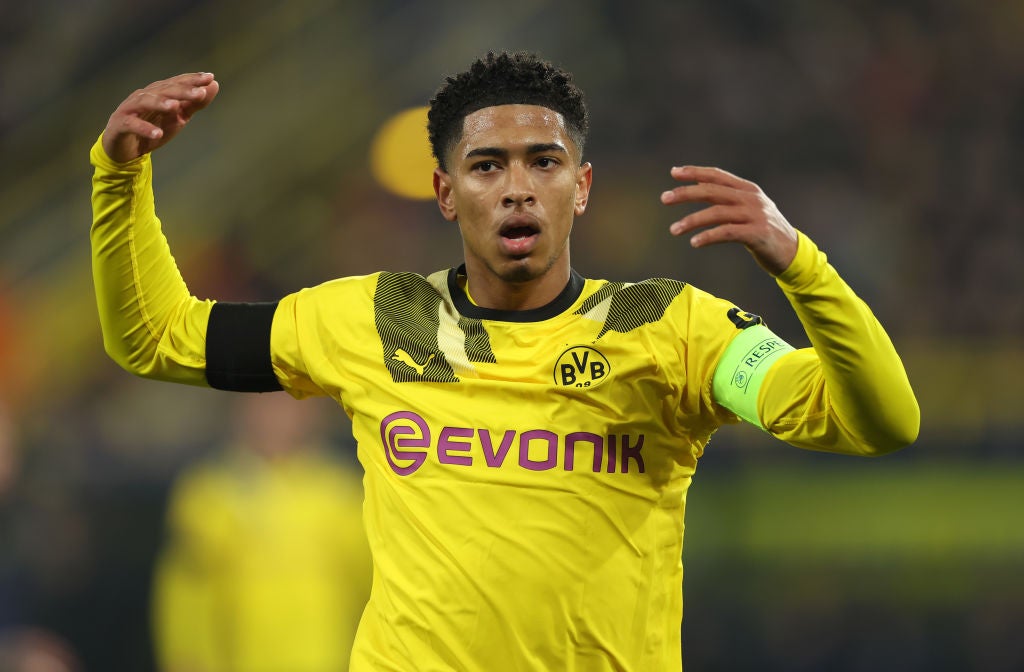
The vast majority of the 81,000 were bellowing “Bellingham”. As the pitch announcer ran through the first names of the Borussia Dortmund side, he left it to the crowd to supply the surname. They did so with gusto, particularly when it came to their No. 22. If Chelsea’s visit is to be Jude Bellingham’s last Champions League game at the Signal Iduna Park, he bowed out having made the transition from Championship midfielder to World Cup star. Then again, it may just be his last for a few weeks. The quarter-finals might beckon.
But times have changed since a teenager inspired Dortmund to Champions League glory; it was the last millennium when Lars Ricken did and the realities of the footballing world have altered sufficiently since then. Now one of Europe’s best-supported clubs tend to provide players to clubs with aspirations of conquering the continent instead of enabling them to realise their ultimate ambitions. That may be Bellingham’s fate: perhaps Real Madrid, maybe Liverpool, possibly even a switch to Chelsea which would mean Enzo Fernandez’s reign as their record signing was brief.
If the last feels unlikely and if part of the challenge for Bellingham is to find a club replicating the kind of atmosphere he experiences at Dortmund, a second leg at Stamford Bridge offers the chance for a player who will command a supersized fee to show that money is not everything. Not with the contrasting costs of Dortmund and Chelsea’s squads.
Bellingham against Fernandez was one of four, rather different, head-to-heads for the teenager on Wednesday; the midfielder who surely will cost £100 million against the one who already did, the World Cup quarter-finalist against the World Cup winner. They are scarcely doppelgangers, and the taller Englishman has a more attacking bent whereas the Argentinian has started life at Chelsea charged with anchoring the midfield. The decisive duel, admittedly, was Karim Adeyemi against Fernandez when the roadrunner was isolated against the newcomer on the counter-attack. “Meep, meep,” said Dortmund manager Edin Terzic, and there was only one winner as Adeyemi sped away to score the only goal.
Afterwards, Bellingham spoke of the tough start Adeyemi has had to life at Dortmund; they seemed the mature words of a senior player, but he is 17 months younger than the winger. But then, with Marco Reus benched, he had worn the armband.
It made for a contrast in captains, with one twice the age of the other. The 38-year-old Thiago Silva was playing senior football before Bellingham was born and, if the sight of each at the toss reflected the Brazilian’s longevity, it also showed the Englishman’s precocity.
It was, too, a meeting of Midlanders who showed exile can be a profitable policy in football. Graham Potter and Bellingham both left their homeland to improve; the younger Brummie has gravitated to the top rather quicker.
A more pertinent comparison may be with Mason Mount. An England team-mate is already a Champions League winner, supplying the pass for Kai Havertz’s decider against Manchester City in the 2021 final, but they met at a time when, for different reasons, each has an uncertain future. Mount, Chelsea’s reigning player of the year, has been dropped; until and unless a new contract is agreed, the homegrown success story risks being cast aside amid heavy spending.

He had already lost his place in Gareth Southgate’s side in part because of Bellingham; trading Mount for Jordan Henderson gave the Dortmund man more licence to get forward. It has felt that, after a remarkable rise, Mount has lost the Zeitgeist of late. A bout of push and shove brought an injury-time booking and perhaps reflected a wider frustration.
Bellingham was already in the book. He might have incurred a greater punishment when, on a yellow card, he upended Silva. A reprieve came courtesy of his sidekick: when Emre Can fouled Reece James a few seconds later, it allowed the referee to caution Dortmund’s other central midfielder instead. Yet if Bellingham’s lunge showed a Steven Gerrard-esque determination to get involved in everything that imperilled him, there was more laudable evidence of the range of his game.
He would drop deep to collect the ball from the centre-backs, emerge as the second striker, prompt and point others into position and invariably be free himself. That ubiquity, that sense of leadership, explains why he was fast-tracked to the captaincy. It was also an indication of the affinity he has for a club he seems likely to leave in the summer. But if greater achievements may beckon elsewhere, taking Dortmund into the quarter-finals of the Champions League would be a notable feat nonetheless.







